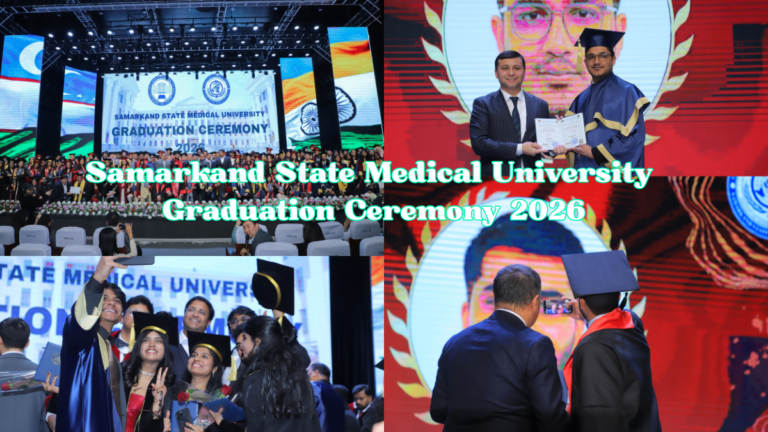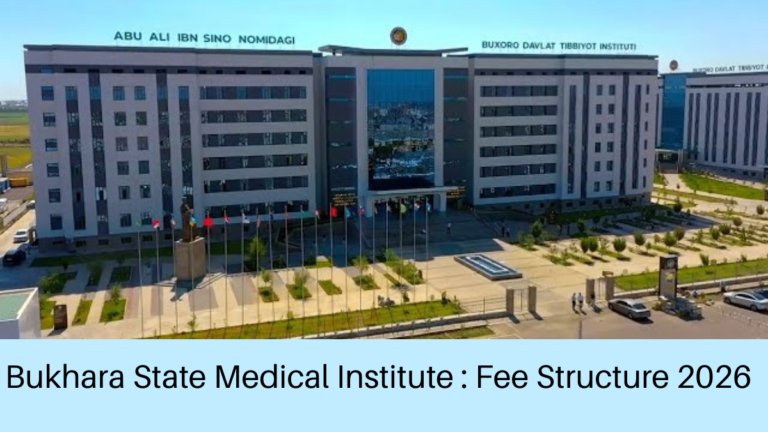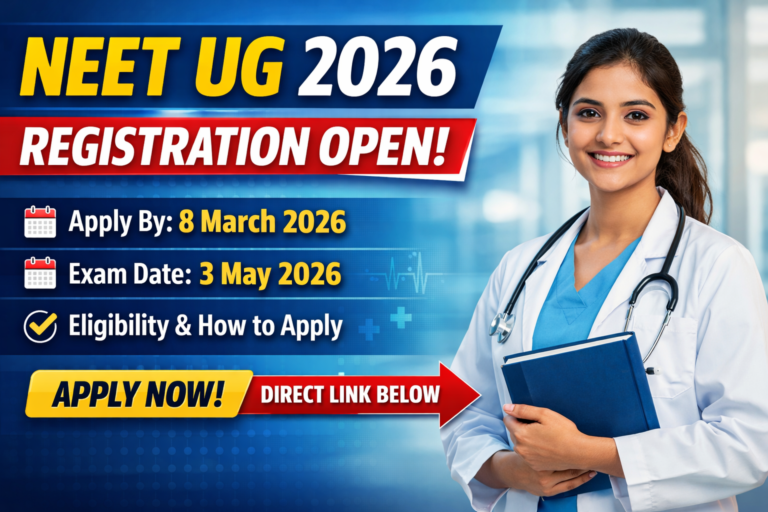Opening Doors to Your Medical Dream
Imagine becoming a doctor, but without the extreme competition and massive fees of private medical colleges in India. Sounds too good to be true? It’s not. Zarmed University in Uzbekistan is making it happen for thousands of Indian students just like you.
Think about this: You need 600+ NEET marks to get into a government medical college in India. Private colleges cost ₹80 to 100 lakhs. But Zarmed University offers quality MBBS education for just ₹33 lakhs total, recognized by India’s National Medical Commission (NMC), and with a clear pathway to practice medicine in India after graduation.
In this guide, Think ED First will walk you through everything you need to know about Zarmed University – from what makes it special to how to apply, step by step.
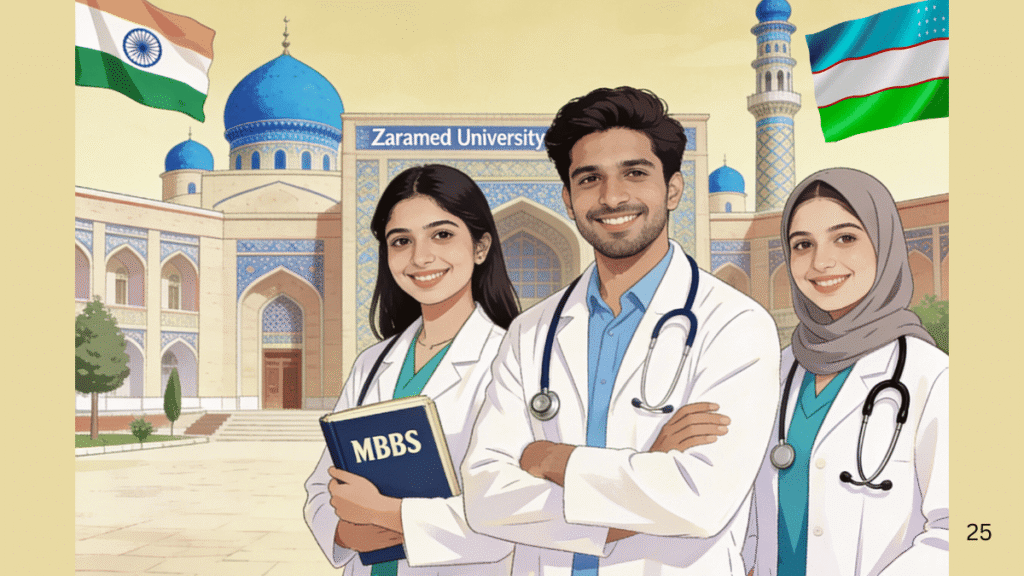
Why Choose Zarmed University? The Real Advantages
1. Affordable Education – 1/3rd the Cost of Indian Private Colleges
Let’s talk money. This is usually the biggest reason families look abroad.
| Expense Type | Zarmed University (Uzbekistan) | Private College (India) |
|---|---|---|
| Tuition per Year | $3,000 | ₹8-20 lakhs |
| Hostel per Year | $600 | ₹2-5 lakhs |
| Total for 6 Years | ₹30 lakhs | ₹80-100 lakhs |
| Extra Fees/Donations | None | Possible hidden costs |
At Zarmed, there are no donation fees, no capitation charges. Your admission is based on merit (your NEET score), not how much money your family has.
2. Still Hard to Get In? Not Here. Real Merit-Based Selection
In India, even if you score 600+ on NEET, there’s no guarantee you’ll get a seat in a government college. The competition is unreal – over 24 lakh students fighting for just 1,17,881 seats.
At Zarmed, if you qualify (50% in PCB, NEET score as per cut off), you get in. No quota drama, no waiting lists.
3. NMC-Recognized, So Your Degree Works Everywhere
Your Zarmed degree isn’t just valid in Uzbekistan. It’s recognized by:
- India’s National Medical Commission (NMC) – you can practice as a doctor in India
- World Health Organization (WHO) – it’s valid globally
- Listed in the World Directory of Medical Schools (WDOMS) – recognized in 190+ countries
4. FMGE Coaching from Day One
Here’s the thing: After MBBS, Indian-trained doctors take the FMGE (Foreign Medical Graduate Examination) to practice in India. Many universities don’t prepare you for this.
Zarmed starts coaching you for FMGE from Year 1. By the time you finish, you’re already prepared. Plus, you also get coaching for USMLE (if you want to work in the USA) and UKMLA (if you want to work in the UK).
5. Only 2.5 Hours from India
Uzbekistan is not far. Direct flights from Delhi, Mumbai, Kolkata, and Ahmedabad take just 2.5 hours. Your parents can visit. You can come home for vacations. You’re not on the other side of the world.
6. Safe, Student-Friendly Environment
Uzbekistan is one of the safest countries in Central Asia. Zarmed has:
- Separate, secure hostels for boys and girls
- 24/7 security staff
- Indian food cooked in the university cafeteria (so you’re not missing home cooking)
- Regular cultural programs and student support
7. Modern Teaching & Real Hospital Training
Zarmed isn’t just lectures. You get:
- Digital classrooms with smart boards
- Simulation labs where you practice before touching a real patient
- Zarmed Pratiksha Hospital on campus – a real hospital where you train from Year 1
- Rotations in major hospitals across Bukhara and Samarkand
Understanding the Zarmed MBBS Program: What You’ll Study
The MBBS program is 6 years long. Here’s how it’s structured:
Years 1-3: Foundational Medical Sciences
You learn the basics of how the human body works. Subjects include:
- Anatomy: Understanding the structure of the human body
- Physiology: How different body systems work
- Biochemistry: Chemical processes in your body
- Pharmacology: How medicines work
- Microbiology: Bacteria, viruses, and other microorganisms
- Pathology: What goes wrong in diseases
This phase is very practical. You’re not just reading textbooks – you’re in labs, dissecting models, and learning hands-on.
Years 4-6: Clinical Training & Internship
Now you work in actual hospitals, treating real patients (under supervision). You rotate through:
- Internal Medicine: Common illnesses like diabetes, heart disease
- Surgery: Operations and surgical procedures
- Pediatrics: Treatment of children
- Obstetrics & Gynecology: Pregnancy and childbirth
- Psychiatry: Mental health
- ENT, Orthopedics, Emergency Medicine: Other specialties
Year 6 is your internship year. You’re basically working as a junior doctor, learning everything hands-on.
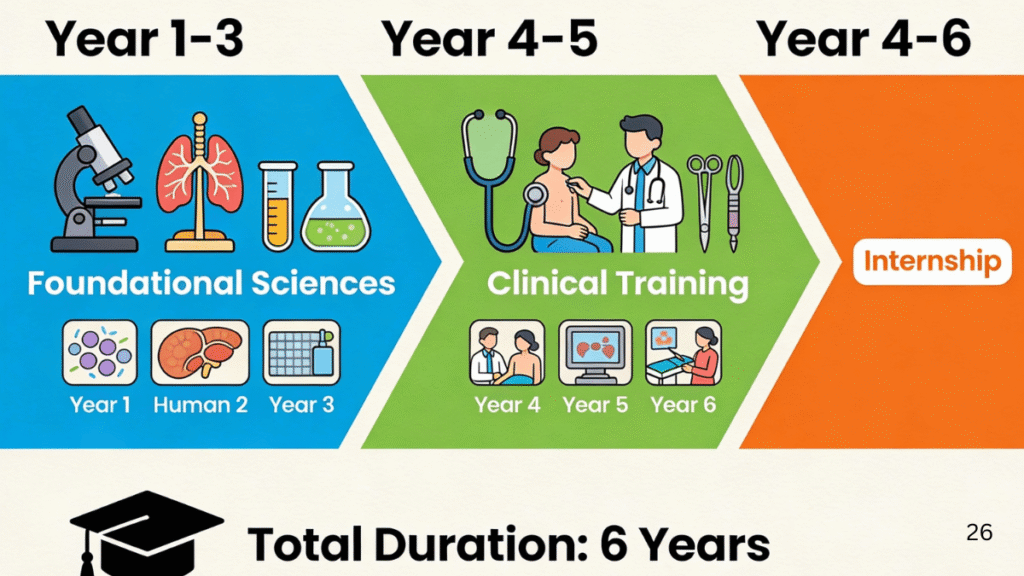
Who Can Apply? Eligibility Made Simple
Good news: If you’re thinking about applying, you probably qualify. Here’s what Zarmed needs:
| Requirement | What You Need |
|---|---|
| PCB Marks (Class 12) | Minimum 50% in Physics, Chemistry, Biology (General category); 40% for reserved category |
| NEET Score | You must take and clear NEET. No minimum cutoff, but higher score = better chances |
| Age | Minimum 17 years old by December 31st of the year you apply |
| English Proficiency | English studied in 12th grade (you don’t need IELTS or TOEFL) |
| Passport | Valid Indian passport with at least 6 months validity |
That’s it. No donation needed. No capitation fee. No waiting list drama.
Quick Eligibility Check:
- ✅ Did you score 50%+ in PCB in Class 12?
- ✅ Did you appear for NEET?
- ✅ Do you have a valid passport?
If yes to all three, you can apply to Zarmed University.
The Real Cost: Money Breakdown for Your Family
Let’s be clear about what your parents will actually spend. Here’s the complete cost breakdown:
Year 1 (First-Time Costs):
| Expense | Amount |
|---|---|
| Admission/Registration Fee | ₹50,000 + GST (one-time) |
| Registration Payment (Initial) | ₹10,000 |
| 1st Provisional Payment | ₹75,000 |
| Tuition Fee (Year 1) | $3,000 |
| Hostel (6-person sharing) | $600 |
| Food (Indian meals) | $1,200 |
| FMGE Coaching & Resources | $500 |
| TOTAL YEAR 1 | ₹6.12 lakhs |
Years 2-6 (Annual Costs):
| Expense | Amount |
|---|---|
| Tuition Fee | $3,000 |
| Hostel | $600 |
| Food | $1,200 |
| Coaching & Resources | $500 |
| Visa Renewal & Insurance | $650 |
| ANNUAL TOTAL (Years 2-6) | ~₹5,35,500 each year |
Grand Total for 6 Years: ₹33 lakhs (approximately)
Compare this to:
- Private college in India: ₹80-100 lakhs
- Government college (if you get in): ₹1-8 lakhs, but you need 600+ NEET marks
Step-by-Step: How to Apply to Zarmed University
Don’t worry – the process is straightforward. Here’s your action plan:
Step 1: Gather Your Documents (Timeline: Now)
Collect these documents:
- ✓ Your passport (color photocopy)
- ✓ 10th and 12th grade mark sheets
- ✓ NEET scorecard (you must take NEET)
- ✓ Birth certificate
- ✓ 4-6 passport-sized photographs (35×45 mm)
- ✓ School leaving certificate
Pro Tip: Get these documents now even before finalizing your decision. Don’t wait until the last minute.
Step 2: Fill the Online Application Form (Timeline: July-August)
Visit the Zarmed University website (zarmeduniversity.com) and fill out the online application form. Upload:
- Scanned copies of all documents mentioned above
- Passport photos
This takes 15-20 minutes.
Step 3: Pay Registration Fee & Get Admission Letter (Timeline: Same month)
Pay ₹20,000 as the registration fee. Important: ₹10,000 is refundable if you change your mind before the next step.
Within a few days, you’ll receive your Provisional Admission Letter in your email.
Step 4: Make the First Payment (Timeline: Before July 31)
Once you have the Provisional Admission Letter, pay: * $1,500 to Zarmed University
This is non-refundable, so be sure before paying.
Step 5: Visa Processing (Timeline: August)
Now comes the visa part. Don’t worry – Zarmed’s team will help:
- Zarmed sends you an official invitation letter for the Uzbekistan student visa
- You prepare documents:
- Your passport
- Bank statements (3 months) showing ₹4-5 lakhs
- Medical fitness certificate
- Photos (35×45 mm)
- Completed visa application form
- Apply for the visa through the Uzbekistan embassy
- Visa processing: Takes 15-20 working days
- You get your visa approval (98% success rate for Indian students at Zarmed!)
Pro Tip: Think Education First team will guide you through every step. They’ve done this thousands of times.
Step 6: Final Payments & Pre-Departure (Timeline: August-September)
Once your visa is approved, pay:
- Other Payment In $ to University.
- $1,500 to Zarmed University.
- Choose your hostel type and pay the annual fee
Also complete:
- Get a medical checkup (health insurance requirement)
- Book your flight ticket to Tashkent (flights from Delhi, Mumbai, Kolkata, Bangalore)
- Arrange travel insurance
Step 7: Arrive in Uzbekistan (Timeline: Late August/Early September)
Think Education First free airport pickup from Tashkent. You’ll be taken to the hostel, given an orientation, and started on your MBBS journey!
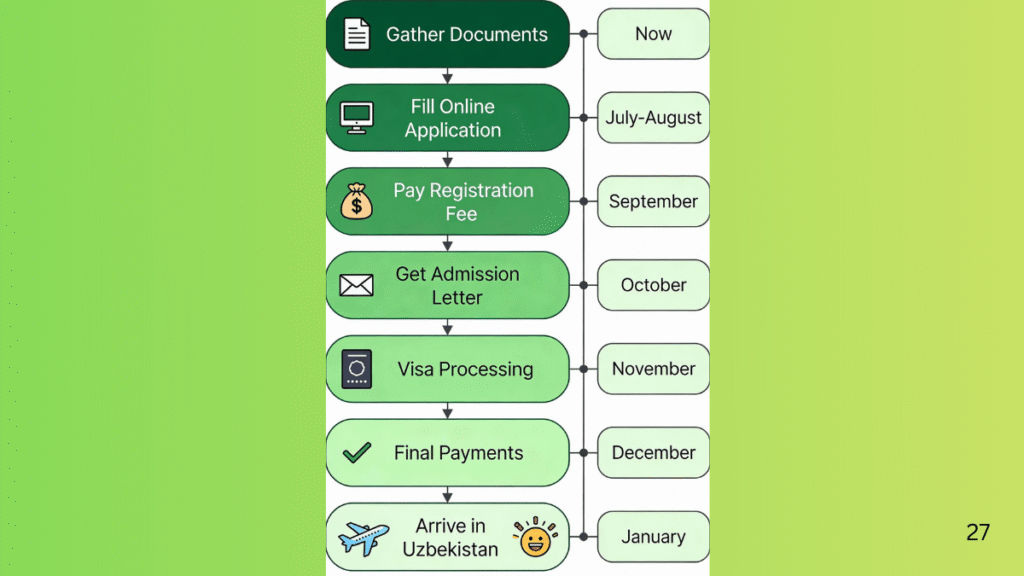
Zarmed’s Two Campuses: Bukhara vs. Samarkand – Which is Better?
Zarmed has two campuses. Here’s how they compare:
| Factor | Bukhara Campus | Samarkand Campus |
|---|---|---|
| Size | Larger (main campus) | Smaller |
| Founded | 2022 | 2019 |
| City Vibe | Historic, peaceful | Historic, cultural hub (“Pearl of the East”) |
| Airport Connectivity | Via Tashkent | Via Tashkent |
| Facilities | Smart classrooms, modern labs | Smart classrooms, modern labs |
| Hospital Training | Zarmed Pratiksha Hospital | Affiliated hospitals |
| Climate | Mild winters, hot summers | Mild winters, hot summers |
| Student Preference | Growing choice | Also good |
Honest Take: Both are equally good. The curriculum is the same. The faculty is the same. Both have Indian food, secure hostels, and good clinical training. Your choice depends on personal preference – do you prefer a slightly bigger campus (Bukhara) or a more historic, cultural city (Samarkand)?
What Makes Zarmed Different? Key Highlights
Indian Professors, Not Just Foreign Teachers
“Many universities abroad have foreign professors who might not understand how NEET or FMGE exams work. In contrast, Zarmed has full-time Indian doctors and professors teaching you who understand Indian medical education standards.”
FMGE Preparation from Year 1
You’re not cramming FMGE preparation in Year 6. Zarmed integrates FMGE-style learning throughout your course. This is a huge advantage.
Modern Hospital on Campus
Zarmed Pratiksha Hospital is not just a training ground – it’s a real, functioning hospital where you work from Year 4 onwards. You’re not practicing on models; you’re helping real doctors treat real patients.
No Donation Fees
Unlike many private colleges in India, Zarmed doesn’t ask for “donations” or “capitation fees.” Your merit (NEET score) is all that matters.
Life as a Zarmed Student: What’s a Day Like?
Morning (8:00 AM – 1:00 PM): Classes, lectures, or practical lab sessions. You’re learning anatomy by dissecting models, doing biochemistry experiments, or watching surgeries.
Afternoon (1:00 PM – 2:30 PM): Lunch in the cafeteria. Yes, there’s Indian food – dal, rice, rotis, curries. You won’t miss home food.
Afternoon (2:30 PM – 5:00 PM): More classes, seminars, or clinical rotations (in later years, you’re in hospitals).
Evening (5:00 PM onwards): Hostel time. You study, exercise, hang out with friends, or participate in university events.
Weekends: Explore the city, visit historical sites, relax, or study.
Special: Regular cultural programs, sports activities, and mentorship sessions.
Cost of Living Outside College:
- Local transportation: Very cheap ($2-5/month)
- Eating out: Affordable ($2-5 per meal)
- Entertainment: Budget-friendly
- Internet/Phone: Very cheap
Common Questions Students Ask
Q: Can I practice in India after graduating from Zarmed?
A: Yes, absolutely. You pass the FMGE (Foreign Medical Graduate Examination) and then you’re a registered doctor in India, just like any Indian medical college graduate.
Q: What if I don’t get a visa?
A: Zarmed has a 98% visa success rate for Indian students. Plus, the ₹20,000 registration fee is partly refundable (₹10,000) if your visa gets rejected. But honestly, rejection is very rare.
Q: Is the degree recognized in other countries like USA/UK?
A: Yes. WDOMS recognition means your degree is valid globally. You can appear for USMLE (USA), UKMLA (UK), or practice in most countries after passing their licensing exams.
Q: Do I have to learn Uzbek language?
A: No. The entire program is in English. But learning a bit of Uzbek is fun and helps with daily life!
Q: Can my parents visit me?
A: Yes. Flights from India to Uzbekistan are just 2.5 hours. Your parents can visit during holidays.
Q: What if I’m not good at studies? Will I fail?
A: Zarmed provides continuous support, coaching, and mentorship. Regular assessments help you stay on track. It’s not easy (medical school isn’t anywhere!), but with effort, you’ll succeed. The fact that Indian professors teach you means they understand your learning style.
Q: How is the climate in Uzbekistan?
A: Mild. Summers are hot (around 35°C), winters are cool (5-10°C). Nothing extreme like Russia’s -30°C. Very manageable.
Your Action Plan: Get Started Today
If you’re interested in Zarmed University, here’s what to do right now:
This Week:
- ✓ Check your class 12 marks – do you have 50%+ in PCB?
- ✓ Confirm you’ll be taking NEET (or have already taken it)
- ✓ Talk to your parents – discuss the cost and timeline
- ✓ Start gathering documents (passport, mark sheets, etc.)
Next Week:
- ✓ Visit zarmeduniversity.com to see the campus and courses
- ✓ Watch student testimonials (there are many happy Zarmed students)
- ✓ Connect with Think ED First for free counseling – we’ll answer your specific questions
Before July/August:
- ✓ Apply online to Zarmed
- ✓ Pay the registration fee
- ✓ Get your provisional admission letter
- ✓ Start visa processing
Remember: This is a 6-year commitment to becoming a doctor. It’s exciting, challenging, and absolutely worth it. But choose wisely, ask questions, and get proper guidance.
Why Think ED First is Your Best Guide
At Think ED First, we’re not just another consultancy. We specialize in helping Indian students find the right medical college abroad – whether it’s Zarmed University, or other NMC-recognized institutions.
Here’s what we do for you:
✓ Free Initial Counseling: Talk to our experts about Zarmed and whether it’s right for you
✓ Document Preparation: We help you gather and organize all documents correctly
✓ Application Support: We ensure your application is perfect (no rejections due to errors)
✓ Visa Guidance: Our team knows the visa process inside out – we guide you step-by-step
✓ Pre-Departure Briefing: Learn what to pack, how to adjust, what to expect
✓ Ongoing Support: Even after you’re in Uzbekistan, we’re here if you need help
Why students trust us:
- We’ve helped 1000+ students get admitted to universities abroad
- We understand NEET, MBBS abroad, and everything in between
- We’re honest – if a university isn’t right for you, we’ll tell you
- We keep you updated with the latest information
Final Words: Your Medical Career Starts Here
Becoming a doctor is a big dream. The competition is tough. The costs are high. But it’s not impossible – especially with the right guidance.
Zarmed University is proof that quality medical education doesn’t have to cost ₹80 lakhs or require a 600+ NEET score. It’s achievable, affordable, and recognized globally.
Your journey to becoming a doctor is just beginning. And we at Think ED First want to be part of that journey.
Ready to Take the Next Step?
If you or your child is planning for admissions in India or to study abroad, Think ED First is here to guide you every step of the way. Whether you’re interested in Zarmed University Uzbekistan, another medical college abroad, or exploring options in India, we have the expertise to help.
Connect with us today for a free consultation:
📞 Call or WhatsApp: +91 98450 47471
📧 Email: thinkedfirst@gmail.com
🌐 Visit: https://thinkedfirst.com/study-abroad/zermed-university/
Or simply fill out the form below, and our education counselor will get in touch within 24 hours to answer all your questions about Zarmed University MBBS, admission process, costs, visa guidance, and everything else you need to know.
Your medical dream deserves the right guidance. Let Think ED First be your partner.



